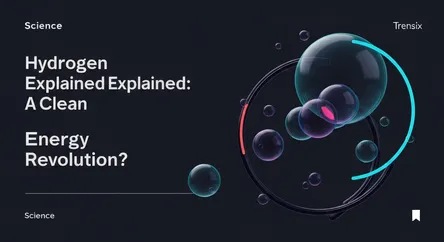Science
Hydrogen Explained: A Clean Energy Revolution?

An overview of hydrogen, the universe's most abundant element, and its trending role as a clean energy carrier set to decarbonize our world.
What is it?
Hydrogen (H) is the simplest and most abundant chemical element in the universe, making up about 75% of all mass. On Earth, it's typically found in compounds like water (H₂O) and hydrocarbons. While not a primary energy source, hydrogen is a powerful energy carrier, meaning it can store and deliver energy produced from other resources. When used in a fuel cell to generate electricity, its only byproduct is water, making it a clean fuel at the point of use. Production methods vary, with "green hydrogen" being produced via electrolysis powered by renewable sources, and "blue hydrogen" derived from natural gas with carbon capture.
Why is it trending?
Hydrogen is trending due to its immense potential to decarbonize the global economy and combat climate change. As nations strive for net-zero emissions, hydrogen is seen as a clean alternative to fossil fuels, especially in hard-to-electrify sectors like heavy industry, aviation, and shipping. This has spurred massive government and private investment into developing hydrogen technologies and infrastructure. The falling cost of renewable energy is making green hydrogen production increasingly viable, positioning it as a key pillar in the future energy mix.
How does it affect people?
The shift to a hydrogen-based economy could significantly impact daily life and public health. Hydrogen can power vehicles, heat homes, and generate electricity with no harmful tailpipe emissions, leading to cleaner air in cities. The expansion of this sector is projected to create millions of jobs in manufacturing, engineering, and maintenance. However, challenges remain, including the safe storage and transport of the highly flammable gas and ensuring its production is genuinely low-carbon. Widespread adoption will require a major buildout of new infrastructure to realize its environmental and economic benefits.